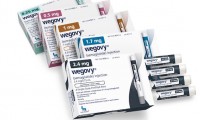-
Wegovy could prevent up to 1.5 million heart attacks, strokes over 10 years, study says
- Source: drugdu
- 200
- August 18, 2023
-
Wegovy shown to reduce risk of heart attack, stroke in major cardiovascular trial
- Source: drugdu
- 129
- August 11, 2023
-
Eco-minded AstraZeneca doubles down on renewable energy push in Sweden
- Source: drugdu
- 114
- August 11, 2023
-
Merck and Ginkgo Bioworks enter biologic manufacturing collaboration worth up to $490m
- Source: drugdu
- 109
- August 10, 2023
-
UK Probes Weight Loss, Diabetes Drugs for Suicidal Ideation and Self-Harm Risk
- Source: drugdu
- 120
- July 28, 2023
-
Pfizer and Flagship Pioneering Sign Drug Discovery Partnership Worth up to $7bn
- Source: drugdu
- 111
- July 24, 2023
-
Pfizer, Flagship Team Up in $100M R&D Pact — 10 New Drugs for Unmet Needs
- Source: drugdu
- 130
- July 20, 2023
-
NVIDIA Invests $50m in AI-enabled Drug Discovery
- Source: drugdu
- 126
- July 17, 2023
-
EMA Concern Stirs over Suicide Risk with Weight Loss GLP-1RA Drugs
- Source: drugdu
- 107
- July 14, 2023
-
Zealand Pharma submits NDA for hyperinsulinism drug dasiglucagon
- Source: drugdu
- 115
- July 5, 2023
your submission has already been received.
OK
Subscribe
Please enter a valid Email address!
Submit
The most relevant industry news & insight will be sent to you every two weeks.













